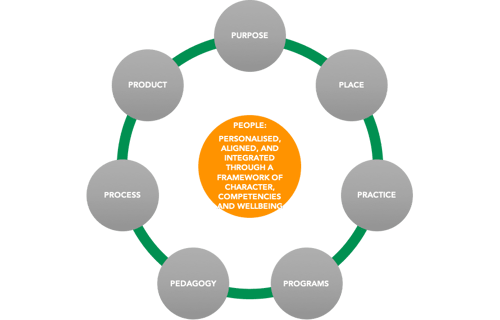Game Changers | Learn
Future Schools
In the 2020s, it seems unnecessary (and perhaps even silly) to be talking about the idea of “21C education”. There is not yet, however, a shared understanding amongst practitioners across the world about what exactly it is that makes the educational requirements of our times stand out from those that came before us.

There is perhaps an emerging consensus that there might be a set of skills or competencies that students need that are perhaps more relevant now, as well as agreement in some quarters about a corresponding set of educational practices that might assist with the development of these. Nonetheless, there remains a lack of clarity around all of this. At a School for tomorrow. we’ve come up with eight “P”s to help us narrow in on what it all might mean.
 A Model for 21C Education
A Model for 21C Education
People: Let’s begin by considering what lies at the heart of everything in education – the people. Education is an industry that is characterised by the way in which the growth of people through learning relationships dominates every aspect of what it is that we do. What we have come to understand is that these relationships work best when they are shaped by a framework whose knowledge architecture is based around developing character (how people learn to live a life by expressing their sense of belonging through civic character, attaining their potential through performance character, and doing what is good and right through their moral character), competency (the capacity of people to demonstrate what they have learned in terms of their knowledge, skills, dispositions, and learning habits), and wellbeing (how people experience health and happiness in their world). This framework must be personalised to the mark of the individual (the inner sense of people as to who they are and who they might become), aligned to the measure of others (the external expectations and requirements of our societies, communities, and institutions), and integrated in the manner in which its aspirations for character, competency, and wellbeing are discovered, diagnosed, decided, designed, and deployed in a Future School.
Purpose: The members of the community of inquiry and practice need to be able to buy into a shared sense of why they are engaged in the work of education. This starts with a set of fundamental words as to ethos – the shared set of beliefs and ideas as to a school’s values (what we stand for), mission (what we are called to do together), and strategy (how we might do this together). The impact of such statements is optimised when through individual and collective acts of leadership, a culture is built in which individuals can wrestle with how they might make a mark and measure up within this context. The rationale of individuals will both connect with and contribute to the collective efforts of the community. In other words, the ethos of the whole will be translated effectively into the voice, agency, and lived experiences of people and groups within the whole.
Place: People within the community need to attach themselves to place. Increasingly, we are coming to realise that a person needs to feel as though they belong before they might reasonably be expected to achieve their potential and do what is good and right in the world. Place has an important role to play in this. The tone and character of the physical (and virtual) environments must match and embody those of the abstractions expressed in purpose. We need to see around us what grounds us both literally and metaphorically, and what feels like a home that inspires, challenges, and supports the growth of character, competency, and wellbeing.
Practice: Of all of the work that is and that needs to be done in a school, it is the labour of the teachers that has the greatest impact on the character, competency, and wellbeing outcomes of the students. While the work of all stakeholders needs to be synchronised, it is teachers in particular (especially through relationships of character apprenticeship) who build the relationships in which learning is modelled, coached, and scaffolded by teachers, and in which expertise is articulated, reflected upon, and explored by students. The practice of teachers, therefore, needs to be both research-driven and evidence-based, and (in time) warranted to the other members of the community in terms of the teacher’s model, inquiry, rigour, and testing of practice.
In the balancing act of defining and nurturing school culture in terms of the school of yesterday, the school of today, and the school of tomorrow, a school which rejects an immediate deference to the status quo and which instinctively, habitually, and restlessly leans forward to the future is more likely to be working towards helping its graduates to achieve outcomes that will see them best placed to thrive in their world.
Programs: Programs in a school, be they in the curriculum, co-curriculum, or extra-curriculum, all need to achieve tangible outcomes that meet the expectations of the community. These outcomes need to be embedded in a deliberate, targeted, and intentional fashion, and progress against these outcomes needs to be assessed and reported against in a formal and informal manner that is authentic, timely, and empowering.
Pedagogy: Teachers who are most successful in their work in developing the character, competency, and wellbeing of their students employ a set of both proven and experimental pedagogies that blend the planned with the spontaneous, and the explicit with the implicit in terms of the rationale, language, and methodology, of what they are trying to achieve.
Process: All of these aspects of a Future School, and especially the pedagogies, need to be shared through the ongoing professional conversations of the teaching faculty. The processes of the school need to support the quality and frequency of this discourse, and draw together and the galvanise the commitment and contributions of other stakeholders – including students, families, non-teaching staff, alumni, governors, and broader community members – to this critical aspect of the social enterprise of a Future School.
Product: Most of all, people in a Future School can at least agree that in the balancing act of defining and nurturing school culture in terms of the school of yesterday, the school of today, and the school of tomorrow, a school which rejects an immediate deference to the status quo and which instinctively, habitually, and restlessly leans forward to the future is more likely to be working towards helping its graduates to achieve outcomes that will see them best placed to thrive in their world. This is the recognised product that the community comes together to work towards and which comes to define the strategic and operational activity of the school, as well as the value proposition that its stakeholders can both co-create and validate over time
Building, implementing, and evaluating an education that genuinely seeks to grow the character, competency and wellbeing of students so that they can thrive in their world requires an agreed vision for what this school might look like. This needs to be expressed in terms of an agreed strategy towards and approaches to leadership that create a shared sense of purpose, place, practice, programs, process, and product. It is when we do this that we can become the leader our school needs us to be.






